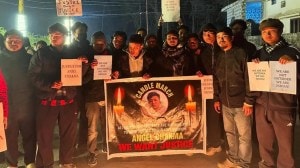Riding Scooter
Policy and moral lessons for US 8212; and for us 8212; from a high-profile conviction

The conviction of I. Lewis 8216;Scooter8217; Libby, former chief of staff to American Vice President Dick Cheney, brings the Bush administration a setback and an opportunity. Libby stands convicted of misrepresenting facts to the FBI officials and a grand jury in investigations into the outing of the identity of a CIA agent. That 2003 scandal was so intimately wound up with the case being made for the invasion of Iraq, that this moment will demand of the administration 8212; specifically, George W. Bush who has taken almost individual control of representing policy on Iraq 8212; repentance by clarity. That CIA agent8217;s husband, it may be recalled, had cast very serious doubts then about the administration8217;s case that
Saddam Hussein8217;s Iraq had a robust programme to manufacture weapons of mass destruction.
The WMDs, as we know, never turned up. And Libby8217;s conviction on charges of perjury will leave Bush even more isolated in tackling the aftermath of that invasion. The congressional elections in November took away Defence Secretary Donald Rumsfeld, with Cheney the most prominent votary of the war. Libby8217;s conviction will now diminish Cheney8217;s verve. But here8217;s the opportunity. There were some good reasons for going to war, good liberal reasons. Bush seems to heed them by rejecting immediate withdrawal of American troops, and instead deciding upon a 8220;surge8221; of reinforcements in an effort to calm sectarian strife. If ever there was a moment to concentrate minds in the administration and among its critics on the question of modernising post-war Iraq, this is it.
Closure on a case of high-level executive and political excess therefore brings benefit beyond the immediate future of erring persons. The contrast between the US and India in this regard could not be greater. Too much of our politics and our policymaking remains muddled, because closure is not attained. Appointment of independent special prosecutors would definitely help. But to gain meaningful accountability, India must make perjury a serious crime.
- 01
- 02
- 03
- 04
- 05































